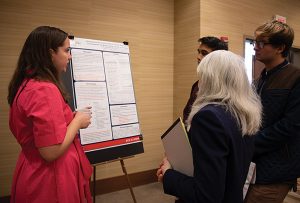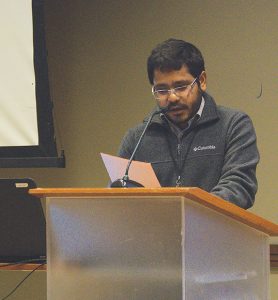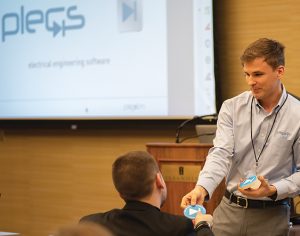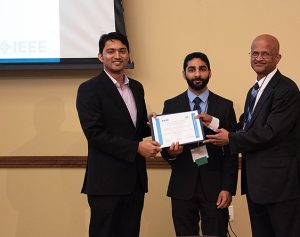2020 – Power and Energy Conference at Illinois, Running for Eleven Years
PECI 2020 is the longest-running student conference and its success is honored by IEEE Industry Application Society (IAS) Tomy Sebastian, the immediate IAS past president, and being copied by at least three other institutions. This has inspired us to consider new possibilities for PECI 2021. One hundred twenty-three attendees from 25 universities, 12 companies and 15 industry professionals, came from the Midwest, across the continent, and as far away as Lebanon, Germany, Paraguay, New Zealand, and China (Canada and South Korea were represented by authors unable to come because of travel restrictions), to attend the eleventh IEEE Power and Energy Conference at Illinois (PECI) (February 27–28).
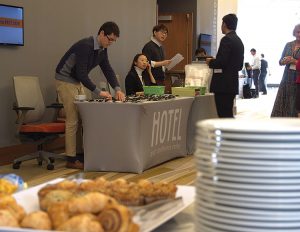
Figure 32: Registration at the I Hotel. Space for networking is in the background with keynote speaker (at right) and snacks for break
This student-focused, student-led and organized conference featured 22 conference paper presentations, in eight technical sessions with invited talks, an undergraduate poster session, four keynote speakers, an in-depth technical tutorial, an alumni panel discussion with panelists from NASA Glenn Research Center, University of Arkansas, PC Krause, General Motors, United Technologies Research Center, and Hinetics; a young professional event, networking, and tours of local research facilities, including the Champaign-Urbana mass transit company showing engines for their hybrid and soon-to-be-on-the-road hydrogen-powered buses.
PECI 2020 centered on the theme, “Contextualizing Energy in the Coming Era.” The keynote speakers addressed the role of context in engineering design (Prof. Ann-Perry Witmer, University of Illinois), protecting transmission lines on today’s power systems (Karl Zimmerman, Schweitzer Engineering Laboratories in Saint Louis), the electrifying future of air transportation (Ralph Jansen, NASA Glenn Research Center), and merging different concepts of time—cyber physical systems design (Marina Rantanen Modéer, The University of Dortmund, Germany).
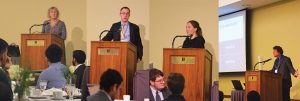
Figure 34: Keynote speakers (left to right): Prof. Ann-Perry Witmer, Ralph Jansen, Marina Rantanen Modéer, and Karl Zimmerman
IEEE IAS, PowerWorld, and IEEE Central Illinois Section contributed financial support; Plexim provided gifts in kind: licenses; the ECE Power Affiliates Program and Grainger CEME were research supporters; and NSF funded student travel based on the following criteria: women, minorities, and undergraduates from schools not offering a PhD.
The NSF funding goal is to encourage undergraduates and early career graduate students to attend, network, find mentors, and get feedback on their research progress.
Eighty-nine percent were women or minorities, counting 19 non-authors from 10 different universities, including University of Illinois Urbana-Champaign, University of South Carolina, Oregon Institute of Technology, University of Wisconsin Madison, Southern Illinois University – Edwardsville, University of Wisconsin – Milwaukee, University of Minnesota – Twin Cities, Tuskegee University, and University of California Berkeley and three students from the Navajo Technical University.
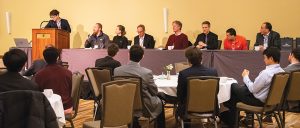
Figure 39: Alumni panel: Moderator Andy Yoon, Jackson Lentz, Katherine O’Kane, Chris Barth, Professor Roy McCann, Brian Raczkzkowski, and Zak Sorchini
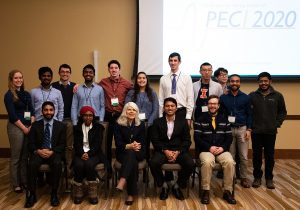
Figure 36: Organizing Committee: Megan Culler, Theepan Balachandran, Adriano Lima Abrantes, Sujay Dasgupta, Noah Salk, Richa Vijayvergiya, Josh Feldman, Peter Xiao, Andy Yoon, Shivang Agrawal, Dipanjan Das (back); (front) Avinash Madavan, Mel Bezandry, Joyce Mast, Abhiroop Chattopadhyay, and Aaron Anderson
Feedback from awardees indicated that many were planning to submit papers or posters for PECI 2021.
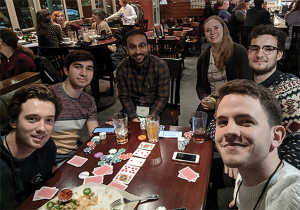
Figure 34: Young Professionals social event after the banquet. Committee members Shivang and Megan and conference attendees enjoying snacks, games and prizes in Hoolihan’s restaurant at the I Hotel
